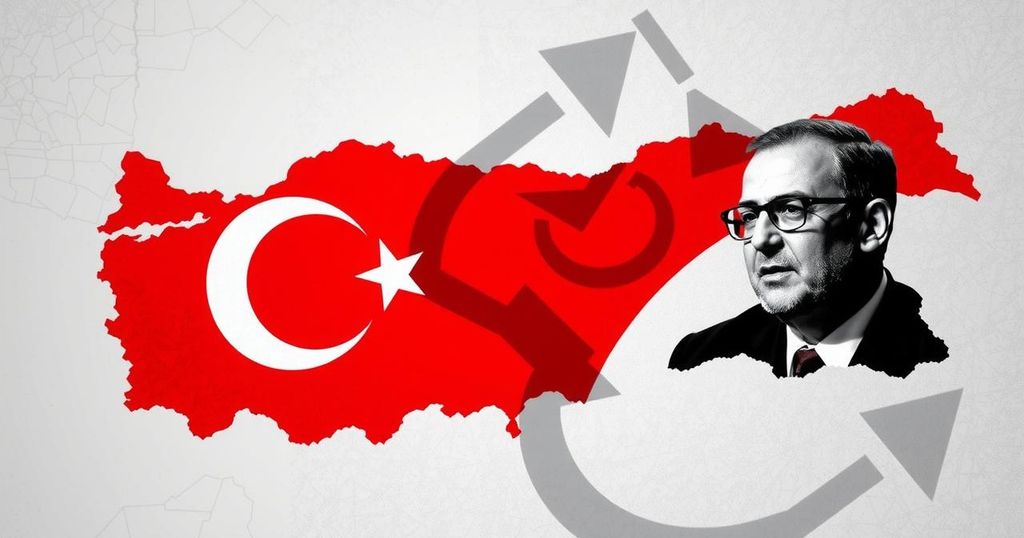World news
ASIA, ASSAD, BASHAR AL - ASSAD, DID, ERDOGAN, EUROPE, EUROPE/ASIA, EUROPEAN UNION, FIGHTER JETS, FOREIGN POLICY, FRANCE, KURDISTAN WORKERS ' PARTY, MANBIJ, MILITARY ACTIONS, NORTH AMERICA, PKK, REC, SYRIA, SYRIAN CIVIL WAR, SYRIAN CONFLICT, SYRIAN DEMOCRATIC FORCES, TURKEY, UNITED STATES, WAR
Elena Martinez
0 Comments
Turkey’s Ascendance in Syria Post-Assad: Implications for Regional Dynamics
Turkey’s geopolitical influence has surged following the fall of Bashar al-Assad in Syria. President Erdogan’s strategic interests involve neutralizing Kurdish factions perceived as threats. The recent capture of northern territories by Turkish-backed rebels highlights this ambition, even as Turkey faces complex challenges regarding the Syrian refugee population. Erdogan’s approach toward the new Syrian government remains uncertain, with crucial implications for both regional stability and Turkey’s foreign relations.
The recent overthrow of Bashar al-Assad has positioned Turkey as a significant player in the evolving dynamics of the Syrian conflict, despite emerging strategic challenges for President Recep Tayyip Erdogan. Assad’s rejection of Erdogan’s offer for collaboration led to his subsequent downfall as the rebel forces, particularly Hayat Tahrir al-Sham (HTS), advanced on Damascus. This shift grants Turkey a pivotal role in shaping the future of Syria, notably influencing Kurdish presence along their shared border. Turkey remains committed to countering the Syrian Kurdish People’s Protection Units (YPG), perceived by Ankara as an extension of the Kurdistan Workers’ Party (PKK), labeled a terrorist organization by Turkey and its Western allies. Following Assad’s ouster, Turkish-backed forces swiftly seized control of the Manbij region, further consolidating Ankara’s influence in northern Syria.
Turkey’s military involvement since 2017, including the stationing of 15,000 troops in Idlib, evidences its strategic foresight. The Turkish National Army, often perceived as a mere collection of factions, has been actively armed and supported by Ankara, participating alongside HTS in the recent offensive. Erdogan’s broader objective encompasses establishing a secure buffer zone along the Syrian border to eliminate Kurdish militancy, thereby facilitating a strategic territorial expansion for Turkey. The potential fragmentation of Syria into sectarian zones poses additional implications for Ankara’s endeavors and raises questions regarding the future status of Kurdish populations in the region.
The ongoing Syrian refugee situation complicates Erdogan’s domestic political landscape, with over 3 million displaced individuals residing in Turkey. Although Erdogan may seek to repatriate a significant number of refugees, logistical challenges remain overwhelming, particularly given many refugees’ apprehension about returning to a still volatile Syria. Observers note that the public sentiment among refugees, which appears hopeful at present, may shift as stability in their homeland remains uncertain.
Erdogan’s attempt to reconcile with Assad, supported by Russian cooperation, underscores the shifting landscape of Turkey’s foreign policy in the region. Despite the Assad regime’s recent setbacks, pivotal questions remain regarding the future of Russian military presence in Syria, particularly at the critical Tartus base. As the new Syrian leadership navigates its path forward, it remains to be seen whether a rapprochement with Turkey will align with Kurdish interests and broader regional stability. Erdogan emerges as a key actor amidst these developments, yet the long-term consequences of Assad’s fall will reveal more nuanced outcomes as relations evolve in Syria.
The article discusses the geopolitical ramifications of Bashar al-Assad’s recent overthrow in Syria, particularly concerning Turkey’s expanding influence in the region. Assad’s rejection of cooperation with Turkey and the subsequent advances of rebel groups underscore the complex interplay of power dynamics that have characterized the long-standing conflict. The article provides insights from Didier Billion regarding Turkey’s strategic interests, especially in relation to Kurdish groups along the Turkish-Syrian border and the broader implications for regional stability. Additionally, the refugee crisis presents significant challenges for Erdogan’s domestic politics, complicating his administration’s stance on repatriation and integration.
In conclusion, Turkey stands out as a principal beneficiary of the recent upheavals in Syria, possessing a strategic advantage following the fall of Assad. While Erdogan’s administration has made substantial strides in solidifying influence and reinforcing territorial security, the unfolding political landscape in Syria necessitates careful observation of future interactions between Turkey, the new Syrian leadership, and the Kurdish forces. The complexities surrounding the return of refugees further exemplify the challenges faced by Erdogan, illustrating the intricate balance between domestic concerns and foreign policy objectives. Turkey’s ability to navigate these challenges will ultimately determine its long-term regional role.
Original Source: www.france24.com




Post Comment